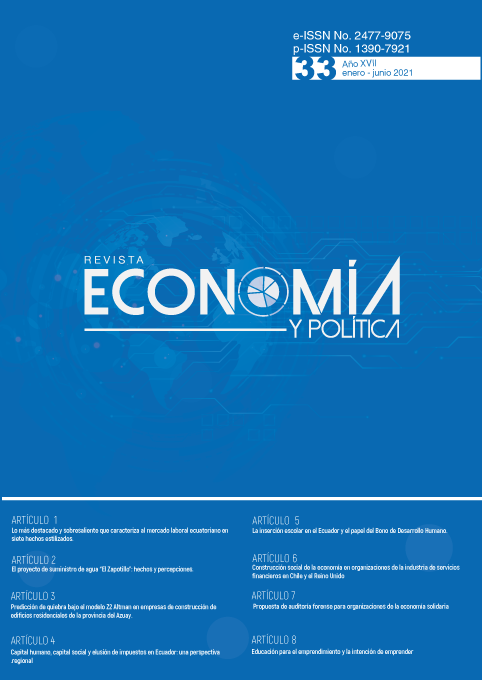Educación para el emprendimiento y la intención de emprender
DOI:
https://doi.org/10.25097/rep.n33.2021.08Palabras clave:
Intención emprendedora, educación empresarial, experiencia laboral, emprendimiento, teoría del comportamiento planificadoResumen
La importancia atribuida al emprendimiento para el desarrollo económico de los países ha despertado interés en los formuladores de políticas socio económicas e investigadores. Desde el punto de vista académico se trata de dar respuesta a qué factores motivan e influyen en la actividad emprendedora, siendo la intención, un elemento clave para la comprensión del proceso de creación de nuevas empresas. Por tal motivo, el objetivo de este estudio es analizar la influencia de la educación empresarial y la experiencia laboral en la formación de la intención emprendedora de estudiantes universitarios. Se plantea un modelo de intención empresarial a partir de la teoría de la conducta planificada. Los resultados indican una influencia significativa de las capacidades empresariales percibidas sobre la intención emprendedora a través de la actitud hacia la conducta, la norma subjetiva y el control percibido; los conocimientos sobre emprendimiento influyen indirectamente a través del control percibido. La experiencia laboral influye positivamente en las capacidades empresariales percibidas y la educación en emprendimiento.
Descargas
Citas
Aboobaker, N., & Renjini, D. (2020). Human capital and entrepreneurial intentions: do entrepreneurship education and training provided by universities add value? On the Horizon, 73-83.
Aguirre, J. C., Peralta Zuñiga, M. L., Mora, P., & Blanco, F. (2020). Emprendimiento innovador y calidad de vida. El caso de Ecuador. Academia Revista Latinoamericana de Administración.
Ajzen, I. (1991). The theory of planned behavior. Organizational Behavior and Human Decision Processes(50), 179–211.
Alemany, L., Álvarez, C., Planellas, M., & Urbano, D. (2011). Libro blanco de la iniciativa emprendedora en España. Barcelona: Fundación Príncipe de Girona.
Alonso, M. J., & Galve, C. (2008). El emprendedor y la empresa: una revisión teórica de los determinantes a su constitución. Acciones e Investigaciones Sociales, Universidad de Zaragoza.
Arias, B. (2008). Desarrollo de un ejemplo de análisis factorial confirmatorio. Universidad de Valladolid Arias, B. (2008). Desarrollo de un ejemplo de análisis factorial confirmatorio. Universidad de Valladolid
Asimakopoulos, G., Hernández , V., & Peña Miguel, J. (2019). Entrepreneurial Intention of Engineering Students: The Role of Social Norms and Entrepreneurial Self-Efficacy. Sustainability.
Astudillo, S., Mora, P., & Pozo, S. (2019). Evaluación de la cátedra de emprendimiento desde su intención emprendedora en una universidad pública en Cuenca. Brazilian Journal of Development.
Audretsch, D. B., Kuratko, D. F., & Link, A. N. (2015). Making sense of the elusive paradigm of entrepreneurship. Small Bus Econ, 703-712.
Bird, B. (1988). Implementing entrepreneurial ideas: The case for intention. Academy of Management Review.
Bosma, N., & Levie, J. (2010). Global en trepreneurship Monitor. 2009. “Relación entre los factores institucionales y el emprendimiento: Análisis mediante técnicas cuantitativas". Revista de métodos cuantitativos para la economía., Vol.13, 54- 72.
Bosma, N., Acs, Z. J., Levie, J., Autio, E., & Coduras, A. (2009). The Global Entrepreneurship Monitor United Kingdom 2008 Executive Report. Babson Park, MA, US: Babson College, Santiago, Chile: Universidad del Desarollo. UK: Global Entrepreneurship Research Association.
Cole, A. (1959). Business enterprise in its social setting. Cambridge: Harvard University Press.
Cuadres, C. (2014). Nuevos métodos de análisis multivariante. Barcelona: CMC Editions.
Fayolle, A., & Gailly, B. (2005). Using the theory of planned behaviour to assess entrepreneurship teachig programmes. Centre for Reasearch in Change, Innovation an Strategy of Louvain School of Management.
Gompers, P., Lerner, J., & Scharfstein, D. (2005). Entrepreneurial spawning: Public corporations and the genesis of new ventures, 1986 to 1999. The Journal of Finance, 577-614.
Guerrero, M., & Urbano , D. (2012). Transferencia de conocimiento y tecnología. Mejores prácticas en las universidades emprendedoras españolas. Gestión y Política Pública, 107-139.
Gutiérrez, G. (2011). Educación emprendedora en la universidad. Educando para el futuro, 135-154.
Hair, J., Blanck, W., Babin, B., & Anderson, R. (2010). Multivariate date analysis. A global perspective. Citado en Conferencia de Structural Equation Modeling: An Overview. Lengler J. (2012).
Hoang, G., Le, T. T., Tran, A. T., & Du, T. (2020). Entrepreneurship education and entrepreneurial intentions of university students in Vietnam: the mediating roles of self-efficacy and learning orientation. Education and Training, 115-133.
Hsieh, C. (2016). Do the self-employed more likely emerge from sequential or parallel work experience in business-related functions? Entrepreneurship: Theory and Practice, 307-334.
Huang, C. J., & Liu, C. J. (2005). Exploration for the relationship between innovation, IT and performance". Journal of Intellectual Capital, 237-252.
Issa, E., & Tesfaye, Z. (2020). Entrepreneurial intent among prospective graduates of higher education institution: an exploratory investigation in Kafa, Sheka, and Bench-Maji Zones, SNNPR, Ethiopia. J Innov Entrep. doi:https://doi.org/10.1186/s13731-020-00137-1
Kim, G. (2008). Entrepreneurship and Self-Employment: The State-of-the-Art and Directions for Future . New England Journal of Entrepreneurship.
Kirzner, I. (1978). Competition and Entrepreneurship. Chicago: University of Chicago Press.
Krueger, N. F. (2003). The cognitive psychology in entrepreneurship . Handbook of entrepreneurship research: An interdisciplinary survey and introduction.
Krueger, N. F., Reilly, M. D., & Carsrud, A. L. (2000). Competing models of entrepreneurial intentions. Journal of Business Venturing, 411-432.
Kuratko, D. (2009). Entrepreneurship: Theory Process Practice. United States America: Cengage Learning.
Lasio, V., Amaya, A., Zambrano, J., & Ordeñana, J. (2020). Global Entrepreneurship Monitor Ecuador 2019/2020. Guayaquil: Escuela de Negocios de la ESPOL.
Lazear, E. (2005). Entrepreneurship. Journal of Labor Economics, 649–680.
Lazebnikova , A., Koval, T., & Troyan, V. (2018). La motivación como condición y antecedentes para una actividad de aprendizaje exitosa. Espacios.
Lengler, J. (2012). Conferencia "Structural Equation Modeling: An Overview". Barcelona: Universidad de Barcelona.
Liñan, F., & Santos, F. (2006). La influencia del capital social sobre los empresarios potenciales. Estudios de Economía Aplicada. Universidad de Sevilla, 459-489.
Liñán, F., & Yi-Wen, C. (2009). Development and Cross-Cultural Application of a Specific Instrument to Measure Entrepreneurial Intentions. Entrepreneurship: Theory & Practice.
Liñan, F., Santos, F. J., & Fernández, J. (2011). The influence of perceptions on potential entrepreneurs. International Entrepreneurship and Management Journal volume .
Liñán, F., Urbano, D., & Guerrero, M. (2011). Regional variations in entrepreneurial cognitions: Starp-up intentions of university students in Spain. Entrepreneurship & Regional Development.
Lorz, M., Müller, S., & Volery, T. (2011). Entrepreneurship education: a meta-analysis of impact studies and applied methodologies. Conference Paper, FGF G‐Forum 2011. Zurich.
Lou P., A. E., Dextre J., E., Del Capio G., J., & Jara G., E. (2010). Actitudes de creatividad y emprendimiento en estudiantes de la Universidad Nacional de Ingeniería y su relación con algunas variables socio-demográficas. Revista IIPSI, 139-151.
Mora Pacheco, P. F., Aguirre Quezada, J. C., Álava Atiencie, N. G., & Cordero López, J. F. (2019). Jóvenes universitarios y su apuesta alemprendimiento social. Revista Economía y Política(30). doi:https://doi.org/10.25097/rep.n30.2019.01
Moriano, A., Palací, F., & Morales, J. (2006). El perfil psicosocial del emprendedor universitario. Revista de Psicología del Trabajo y de las Organizaciones.
Reynolds, P. D. (2005). En: Regional variations in entrepreneurial cognitions: Start-up intentions of university students in Spain . Entrepreneurship Regional Development: An International Journal.
Morris, M. (1998). Entrepreneurial Intensity: Sustaintable Advantages for Individuals Organizations and Societies. United States of America: Greenwood Publishing Group .
Ndofirepi, T. M. (2020). Relationship between entrepreneurship education and entrepreneurial goal intentions: psychological traits as mediators. Journal of Innovation and Entrepreneurship.
Oosterbeek, H., Praag, M., & Ijsselstein, A. (2010). The impact of entrepreneurship education on entrepreneurship skills and motivation. Eur. Econ. Rev., 442–454.
Rodríguez, C., & Jiménez, M. (2005). Emprenderismo, acción gubernamental y academia. Revisión de la literatura. Innovar, revista de ciencias administrativas y sociales, Universidad Nacional de Colombia.
Rodríguez, C., & Prieto , F. (2009). La sensibilidad al emprendimiento en estudiantes universitarios: Estudio comparativo Colombia - Francia. Universidad Nacional de Colombia.
Ruiz, M. A., Pardo, A., & San Martín, R. (2010). Modelos de ecuaciones estructurales. Papeles del psicólogo, 34-45.
Schlepphorst, S., Koetter, E. C., Werner, A., Soost , C., & Moog, P. (2020). International assignments of employees and entrepreneurial intentions: the mediating role of human capital, social capital and career prospects. International Journal of Entrepreneurial Behavior & Research.
Schumpeter, J. (1912). Théorie de l’Evolution. Paris: Dalloz.
Shahid, M. S., & Ahsen, S. R. (2021). Linking entrepreneurship education and entrepreneurial intentions: An interactive effect of social and personal factors. International Journal of Learning and Change, 14-33.
Souitaris, V., Zerbinati, S., & Al-Laham , A. (2007). Do entrepreneurship programmes raise entrepreneurial intention of science and engineering students? The effect of learning, inspiration and resources. Journal of Business Venturing, 566-591.
Thornton, M. (1998). The Origin of Economic Theory: A Portrait of Richard Cantillón.
University Twente. (2002). Social cognitive theory
Urbano, D., & Toledano, N. (2008). Invitación al emprendimiento. Una aproximación a la creación de empresas. Barcelona: UOC
Veciana, J. M., Aponte, M., & Urbano, D. (2005). Actitudes de los estudiantes universitarios hacia el espíritu empresarial: una comparación de dos países. Gestión de Emprendimiento, 165-182. doi:https://doi.org/10.1007/s11365-005-1127-5
Vélez, C. I., Bustamante, M. A., Loor, B. A., & Afcha, S. M. (2020). La educación para el emprendimiento como predictor de una intención emprendedora de estudiantes universitarios. Formación universitaria.
Publicado
Cómo citar
Número
Sección
Licencia
Derechos de autor 2021 Revista Economía y Política

Esta obra está bajo una licencia internacional Creative Commons Atribución-NoComercial-CompartirIgual 4.0.






